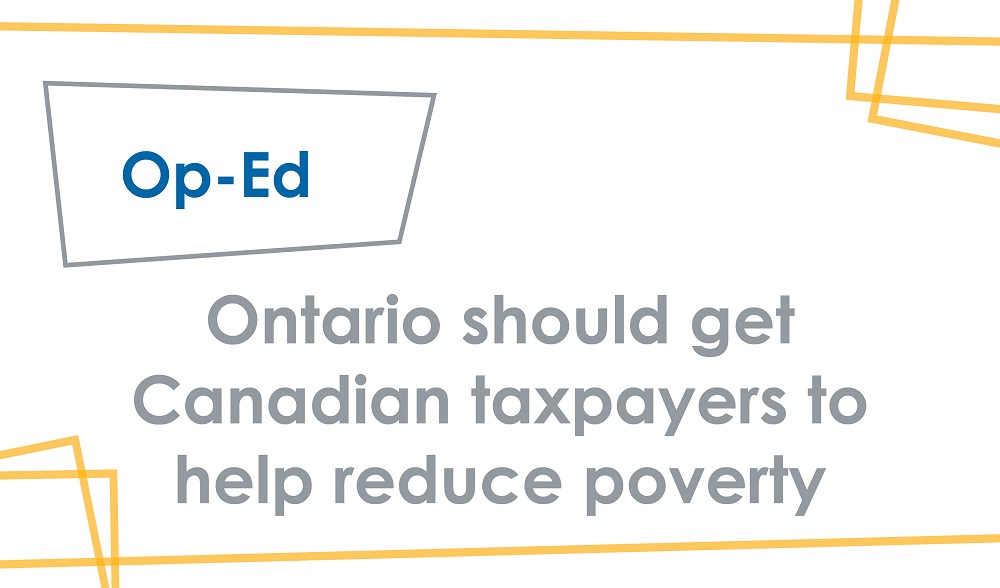Ontario should get Canadian taxpayers to help reduce poverty
Sept 19, 2018 - This column first appeared in Northern Ontario Business.

With the provincial basic income pilot now a thing of the past, we are left with the question of: What should the province do now? First, a couple doses of reality. The provincial government simply does not have the ability to guarantee a job for every Ontarian. It also can’t immediately cure every physical or mental challenge that keeps tens of thousands of Ontarians from working, even part time.
It could, and likely will, make it harder to get benefits. It can, and likely will, increase the incentive to work by enhancing earned income tax benefits and further lowering the “welfare wall” through continued investments in transportation assistance, child care and prescription drug coverage. It could, and may yet, offer relocation assistance to unemployed and underemployed Ontarians who are willing to work and qualify for work that is available, usually at better pay, in other parts of the province. Including almost every region in Northern Ontario.
But the very first thing it should do is to make sure every Ontarian is getting every dollar to which they are entitled from the Canadian taxpayer. That means filing their taxes. We have long known that hundreds of millions of dollars to which low income Canadians are entitled, go unclaimed every year.
Working or not, low income Ontarians are entitled to considerable help from their fellow Canadians. The GST credit, child tax benefit, child care deductions (including payments you might make to grandparents providing care for your kids), retirement savings grants, and disability credits, to name a few. Tax filing also doesn’t just unlock unused federal benefits either. Extended prescription coverage and other provincial benefits are also triggered by the filing of a tax return.
According to a story in the Huffington Post from 2016, the Community Financial Counselling Services managed, in a single year, to put $21 million into the pockets of over 9000 low-income Winnipeggers simply by helping them file their taxes. That’s about $2,300 per person. A 2017 estimate by the federal Department of Finance calculated that the working poor lost out on more than $175 million in benefits by not filing their taxes. This was an estimate based on the 2014 level of the Working Income Tax Benefit, a support designed to encourage work over welfare, and a benefit that has since been significantly increased. Meaning the working poor are likely leaving even more money on the table now than they were in 2014.
The Federal government even launched an effort called: “Helping Canadians Receive the Tax Benefits They Deserve”. The Canada Revenue Agency was mandated to reach out to low income Canadians to encourage them to file their taxes. Similarly, the provincial poverty reduction strategy has offered assistance to students in filling out their taxes, and Ontario Works does expect its clients to file for federal assistance.
In all of these cases however there are either exceptions, or the program is entirely voluntary. Ontario can make it fully mandatory. If you want Ontario benefits, job training, student loans or other assistance, you need to file your taxes and ensure the federal government is supporting you too. “Please submit your last three notices of assessment along with your application.”
The province should make sure every Ontarian, rural or urban, employed or unemployed, Indigenous or non-Indigenous, can and does complete their tax return. Every client who uses an Ontario education or training program, employment office, student services or Ontario Works program should be required to file and, where needed, be assisted in filling out their tax return.
That could mean directing clients down the hall to a helpful volunteer, or it could mean sending them to identified local partners, for-profit or otherwise (H&R Block has a remarkably effective and cheap model). By the way, as a side benefit, training those tax helpers would create needed skills and experience in many urban, rural and remote communities and neighbourhoods. Skills desperately needed by hard working Ontarians looking for the break they need to get back on their feet.
Either way, if the province of Ontario is serious about finding a cost effective way to alleviate poverty and create consistency in the social safety net, 100% tax filing has to be part of it.
Charles Cirtwell is the founding President and CEO at NPI.
The content of Northern Policy Institute’s blog is for general information and use. The views expressed in this blog are those of the author and do not necessarily reflect the opinions of Northern Policy Institute, its Board of Directors or its supporters. The authors take full responsibility for the accuracy and completeness of their respective blog posts. Northern Policy Institute will not be liable for any errors or omissions in this information, nor will Northern Policy Institute be liable for any detriment caused from the display or use of this information. Any links to other websites do not imply endorsement, nor is Northern Policy Institute responsible for the content of the linked websites.
Northern Policy Institute welcomes your feedback and comments. Please keep comments to under 500 words. Any submission that uses profane, derogatory, hateful, or threatening language will not be posted. Please keep your comments on topic and relevant to the subject matter presented in the blog. If you are presenting a rebuttal or counter-argument, please provide your evidence and sources. Northern Policy Institute reserves the right to deny any comments or feedback submitted to www.northernpolicy.ca that do not adhere to these guidelines.
